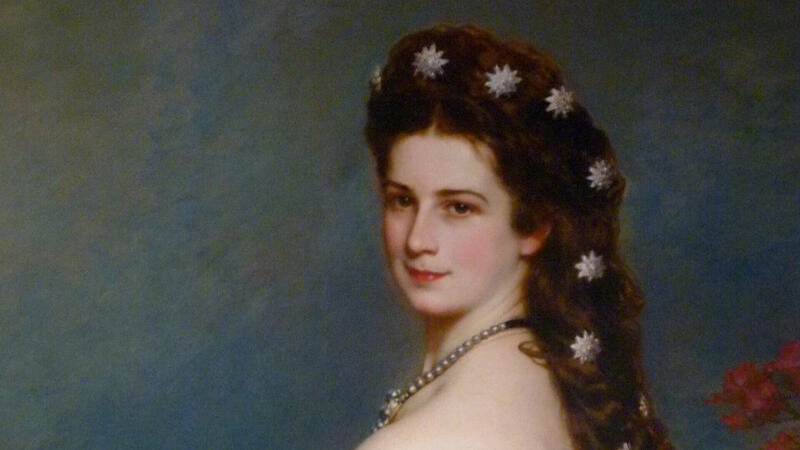Image: APA/Bernau
The scope of the attack was initially not recognized: “Sisi” died an almost casual death, which overtook her in her suite in the “Hotel Beau Rivage” around an hour and a half after the attack. In the same house where the Prime Minister of the German state of Schleswig-Holstein, Uwe Barschel, was found dead in October 1987. In contrast to the mysterious theories surrounding Barschel’s death, everything is clear in the “Sisi case”: It was murder – but basically just a temporary advance of the impending end that the 60-year-old Empress of Austria and Queen already prepared by Hungary.
She had already passed the peak of her life and had long since given up hobbies such as riding, fencing, and even poetry. According to tradition, her beauty was only a legend, which only remained because Sisi – protected by a fan – refused to look at her. Completely shy of people, she withdrew from the public.
Violent tours in wind and weather
Because she had always been inclined to extremes throughout her life, the illnesses of old age also became apparent early on. Excessive exercise, starvation diets and colds caused by violent tours in wind and weather had left deep marks on Sisi’s physique. Elisabeth, this myth of a dreamlike empress, actually had severe rheumatism in the autumn of her existence, weak nerves, parched, wrinkled skin and – as was discovered during the autopsy – several bouts of hunger edema.
“This sensational, violent death in Geneva was like a redemption for a deeply unhappy, mentally ill and physically weak woman, whose departure hardly left a gap,” analyzes the historian Brigitte Hamann, who died in 2016, in her standard work “Elisabeth – Empress against her will “. The statement of a convinced “Sisian” is surprising. However, the statement is credible, as the researcher always bases her interpretations of the imperial-royal life on in-depth source analysis.
The deceased’s daughter, Archduchess Marie Valerie, is said to have analyzed the sudden farewell quite soberly: “Now it has happened the way she always wanted it, quickly, painlessly, without medical advice, without long, anxious days of worry for her loved ones.”
“What did this man actually want?”
In fact, Sisi had already prepared for death, but was still surprised by it. When Luigi Lucheni pounced on his victim around 200 meters from the “Beau Rivage” in the early afternoon of September 10, 1898, his victim reacted with incomprehension. “What did this man actually want?” Sisi is said to have asked her companion, Countess Sztaray, in Hungarian. The traditional answer is telling: “I don’t know, Your Majesty.”
The Empress even reached the ship she wanted to take to the climatic health resort of Caux near Montreux. And because the older lady was staying incognito on Lake Geneva as the “Countess of Hohenembs”, there was initially not much fuss made about the alleged fainting attack. Only when a tiny hole and a brownish stain were discovered on the batiste shirt near the heart did the captain turn around. Any rescue would have come too late anyway. The death certificate issued by the city of Geneva is correspondingly brief: “…died in the Hotel Beau Rivage on September 10th at 2 p.m. 10 minutes in the afternoon.”
Lucheni “in a good mood” during his arrest
An autopsy carried out later revealed an 85 millimeter deep triangular wound. The file had injured the fourth rib, then penetrated the anterior edge of the left lung and the pericardium and pierced the left ventricle.
The assassin fled through Rue des Alpes. At the height of house number five he was overpowered by an electrician and two coachmen. The three men handed Lucheni over to the police around 2 p.m. The officers noted in their report that the assassin was in a “good mood” when he was arrested.
Luigi Lucheni, a former soldier who had nurtured his hatred of feudal social structures as a servant in noble houses, did not regret his actions – on the contrary. Having recently come into contact with the ideas of anarchism, the 25-year-old was convinced that he had made a clear and lasting statement.
“If you don’t work, you shouldn’t eat either,” was his philosophy – somewhat abbreviated – and was influenced by life in the lower class. Sisi came in handy. She was a crowned head, and her murder made the headlines we hoped for. But Lucheni’s triumph gradually faded. Sentenced to life imprisonment, the murderer committed suicide in 1910.
My themes
For your saved topics were
new articles found.

info By clicking on the icon you can add the keyword to your topics.
info
By clicking on the icon you open your “my topics” page. They have of 15 keywords saved and would have to remove keywords.
info By clicking on the icon you can remove the keyword from your topics.
Add the topic to your topics.
Source: Nachrichten




